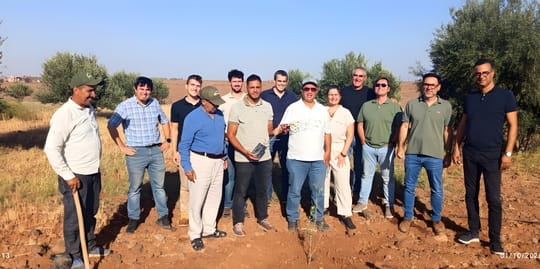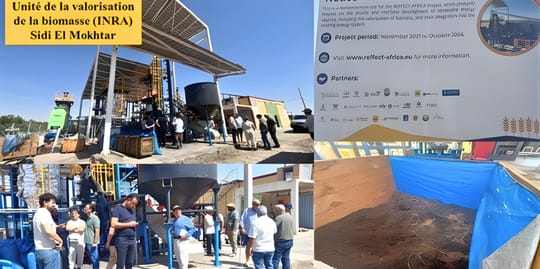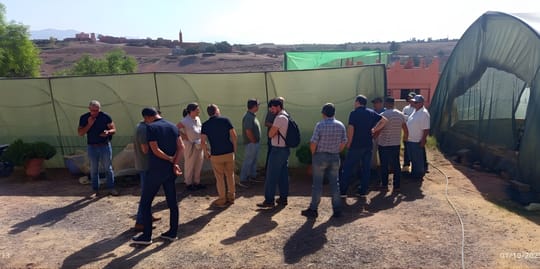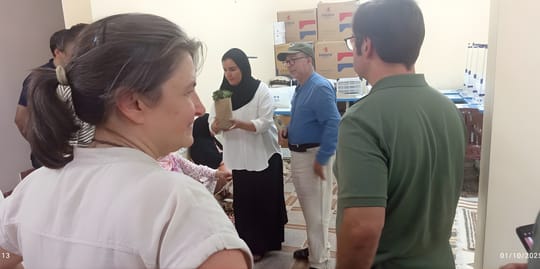Field Visit Reflections: Building Resilience Across Morocco’s Countryside

On the first day of September 2025, a group of agronomists, researchers, and community leaders set out across Morocco to witness how science and local knowledge can work together to build a sustainable countryside.
Organized by the High Atlas Foundation (HAF), in partnership with Morocco’s National Institute for Agronomic Research (INRA) and the African Plant Nutrition Institute, the visit brought together experts from Morocco, Spain, Portugal, and Tunisia. In the words of HAF’s Agroforestry consultant Mr. Larbi Didouqen, this day was “a great success that strengthened both scientific understanding and human connection”. This trip was a vivid portrait of a living ecosystem in transition, which is a network of farmers, researchers, and women artisans testing how circular economies, social innovation, and ancestral knowledge can continuously sustain Morocco’s future.

The journey began at Sidi El Mokhtar, and here stands one of Morocco’s most advanced biomass processing units, a facility operated by INRA as part of the REFFECT AFRICA (2021-2026) project, supported by the European Union and an international consortium of scientists. The site transforms agricultural residues into biochar, a charcoal-like material rich in carbon that is produced through pyrolysis, a process that decomposes organic matter in the absence of oxygen.
Technicians guided the group through the sequence of transformation, through reactors, silos, conveyors, and furnaces that together form a cycle of renewal. The agricultural waste that once cluttered fields or was burned in open air now becomes a regenerative resource. Through this strategy, biochar stores carbon for centuries while restoring the soil’s strength, holding water, and awakening microbial life. It is a small-scale revolution in how rural Morocco values its by-products, a model of circular agriculture where climate mitigation and rural livelihoods meet.
For the HAF delegation, this visit deepened a dialogue between research and action. As the Foundation expands its environmental sustainability initiatives, such as community-managed organic tree nurseries, large-scale tree planting, and carbon credit programs, the promise of biochar stands as a tangible bridge between scientific innovation and the lived realities of farmers facing drought and soil degradation. The site visit concluded with a shared commitment to host future student trainings and knowledge exchanges, ensuring that the lessons of Sidi El Mokhtar will flow beyond laboratory walls and into Morocco’s fields.

A short drive later, the convoy reached the Akrich nursery. Founded in 2012 on land graciously offered by the Jewish community of the city, the nursery is a space where ecology, memory, and coexistence meet together. Thousands of young olive, carob, pomegranate, and fig trees rise here from the soil, their leaves whispering a promise of regeneration.
The nursery’s director explained how each seedling is raised through methods that blend precision and care. Shade structures protect delicate roots from excessive heat, and biodegradable bags replace plastic containers, ensuring that environmental responsibility begins at the very base of growth. Through Picholine marocaine, Arbequina, and Arbosana, the nursery reflects the meeting of Morocco’s soil traditions with worldwide experience. Therefore, the Akrich nursery became what one participant called “a school of the future that teaches through the patience of plants”.
In the afternoon, the group arrived at Achbarou, where the visit turned toward the social and economic dimension of sustainable development. Inside the women’s cooperative, the president, Madame Samira, introduced the team to the members’ work. On the table were samples of biodegradable bags, woven carpets, and local food products prepared by the cooperative. Each activity deeply reflected the cooperative’s focus on creating green employment and strengthening women’s economic independence.
This cooperative began through the IMAGINE program, a cornerstone of HAF’s approach to women’s empowerment. IMAGINE workshops help women reflect on their goals, identify community needs, and design projects that join personal growth with local development. In Achbarou, this process inspired the creation of a cooperative that links environmental responsibility with economic opportunity. By producing biodegradable materials and managing tree planting activities, the members directly contribute to HAF’s environmental sustainability efforts.

Outside the cooperative, the visitors walked through the nearby planting parcels developed by HAF and local farmers. The diversity of trees, including olive, fig, carob, and almond, all demonstrated the principles of agroecology, where biodiversity strengthens soil fertility and ecological balance. The fields are supported by practical infrastructure: small rainwater basins, solar-powered wells, and planting techniques designed to retain moisture in a region increasingly affected by drought.
HAF’s field team explained the process of distributing seedlings and shared their ongoing work to introduce farmers to the concept of carbon markets. This model allows agricultural communities to gain recognition and potential income from practices that store carbon and restore ecosystems. For the visiting experts, Achbarou illustrated how sustainability in Morocco is built through coordination among people and institutions, where social inclusion and ecological innovation move forward together.
Mr. Larbi Didouqen concluded that the visits were important and successful, and the experts expressed their great satisfaction with the actions of HAF. They all show Morocco's transition toward sustainability on a steady, collective practice rooted in its communities. It happens each time a farmer restores degraded soil, each time a woman learns to turn waste into art pieces, each time knowledge moves from research to local hands. And as Larbi reflected in his report, its strength grows from the balance it creates between science and solidarity, between technical progress and human dignity.